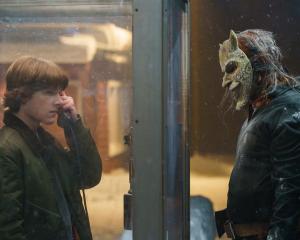It is hard to discern if New Zealand director Alyx Duncan's feature film debut, The Red House, is a case of life imitating art or art imitating life.
Duncan didn't so much reference her past as directly use it for The Red House. The slightly run-down wooden house depicted in the film is, in fact, her childhood home. And the lead actors are her father and stepmother.
Thus reality and fiction blur: Lee (played by Lee Stuart) is depicted as a long-time resident of a small island, a conservationist struggling to protect his fragile world from unchecked development. True. Jia (Meng Jia) grew up in communist China but made her way to the island in search of a new life 20 years ago. Again, true.
Yet The Red House is no documentary. At its heart is a delicate, nuanced love story.
Duncan says she was inspired by her experience growing up on a small island as part of a cross-cultural family, and an incident ''when my father telephoned to say they might be moving overseas''.
In the end, her family didn't move. Yet it still prompted her to make a film in which she explores the question: is home the place you are from, or what you carry inside you wherever you go?
''Obviously, it stems from a personal moment when I questioned whether my home would still exist if all those possessions went away,'' Duncan explains.
''I was living in Wellington at the time, doing my master's in theatre arts and that house kept appearing as a location. I think the things you are inspired by in your childhood keep recurring in adult life.''
Originally intent on making a short experimental documentary, using the house as the focus of the dramatic arc concerning upheaval, Duncan reworked the idea. Her parents were elevated from background extras to leads.
''When I went to film them, I found them so extraordinary and beautiful on camera. They are quite shy but seeing them in their own environment from a director's perspective was quite special.
''I thought, 'Damn, I can't do the original idea'. So I repositioned it as a work of fiction, a drama. It slowly morphed through the writing process until they became the key characters.
''They kept saying, 'Oh, nobody is going to watch this'. So at one point I asked Dad why he kept doing it and he replied along the lines, 'Well, you have to help your children'. They were my hardest critics in a way.''
Parental reservations aside, The Red House was selected for the 2012 New Zealand International Film Festival, with director Bill Gosden describing it as ''a thing of quiet wonder''. Duncan's work won ''Best Self-Funded Film'' at the 2012 New Zealand Film Awards. Now, a wider audience has a chance to watch The Red House as it has gone to general release (it opened at Dunedin's Metro Cinema on Thursday).
''For a little movie like this, which has an art-house audience, the grass-roots approach is best,'' Duncan says of her decision to distribute the movie herself rather than engage a third-party company.
''Also, the autumn timing of its release could help as some people don't like going to the movies in summer.''
Duncan began working on the screenplay for The Red House in 2008, with filming done in four stages. Despite the ''self-funded'' title of her film's award (Duncan spent $45,000 of her own money on the film), the project did receive outside assistance, notably from Asia NZ, Creative New Zealand and the New Zealand Film Commission.
Duncan is a film-maker and choreographer whose interests range from live performance, installation and music videos, to television commercials.
See it
The Red House is screening at Metro Cinema, Dunedin.












